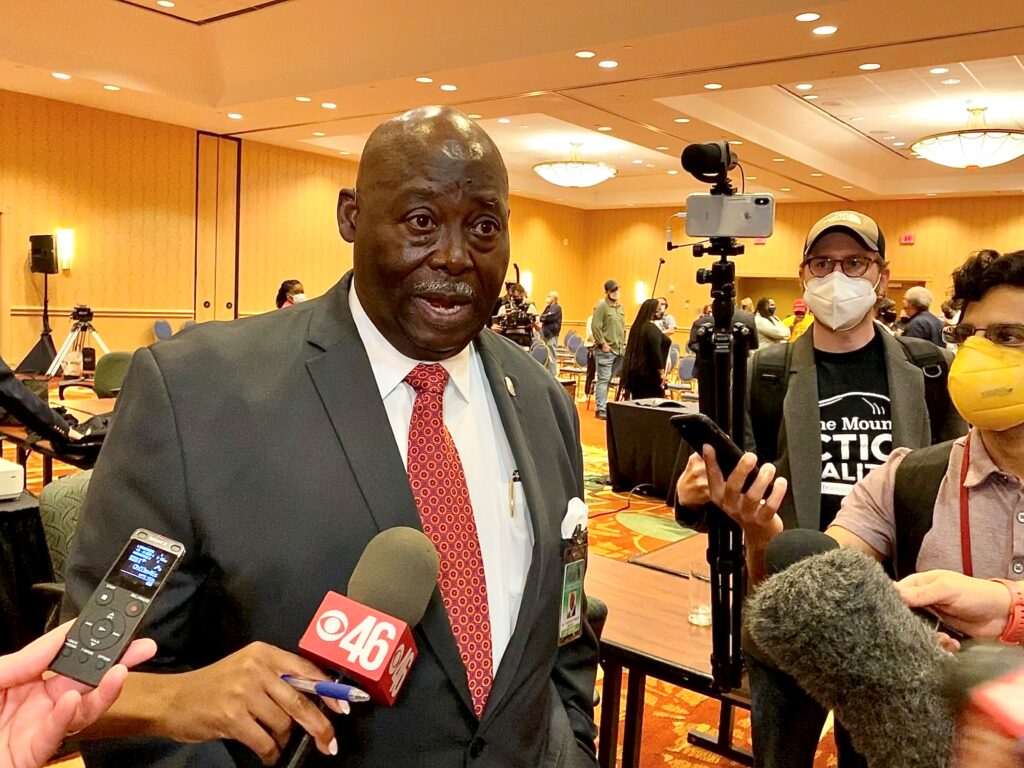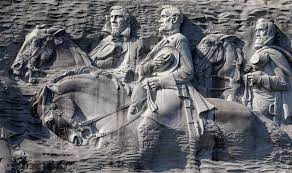
Stone Mountain could see changes around the park’s controversial Confederate carving and other symbols under proposals expected to face votes next month.
Recommendations to set up a new museum exhibit telling the checkered history of the large Confederate mountainside carving and to relocate Confederate flags at the park were pitched at a Stone Mountain Memorial Association board meeting Monday.
Monday’s meeting was the first chaired by Rev. Abraham Mosley, who was tapped last week as the association’s first Black chairman after serving on its board of directors since 2019. Mosley said the exhibit and relocation proposals mark a “good start” to address widespread problems with the park.
“You can’t get there overnight,” Mosley said after Monday’s meeting. “If you’re going to walk a mile, you’ve got to take that first step.”
The giant carving has long faced outrage as a symbol glorifying the Confederacy, depicting Confederate President Jefferson Davis and Confederate generals Robert E. Lee and Thomas “Stonewall” Jackson. The adjacent park features Confederate flags and street names also targeted for removal and renaming.

Efforts to erase the carving gained steam amid recent nationwide protests against racism and police brutality but remain hamstrung by a state law enacted in 2001 that forbids altering or removing “the memorial to the heroes of the Confederate States of America graven upon the face of Stone Mountain.”
That law was bolstered by legislation the General Assembly passed and Gov. Brian Kemp signed in 2019 that bans removing, relocating or defacing monuments and other historical symbolsowned by state agencies including those dedicated to the Confederacy.
Despite legal limitations, the association’s CEO, Bill Stephens, unveiled recommendations Monday to build a new exhibit that “tells the story of the carving” including the park’s 1915 hosting of a revived Ku Klux Klan.
His proposals call for relocating Confederate flagsin the park, renaming Stone Mountain’s Confederate Hall Historical and Environmental Education Center to “Heritage Hall,” renaming certain streets like Highway 78 in honor of Georgia leaders and building a chapel on the mountain’s summit.
Stephens said the proposals aim to ease concerns from potential new corporate partners looking to fill the sponsorship gap left by Marriott, which he said does not plan on renewing a longstanding partnership with the park to run its main hotel and conference center that is set to expire in 2022.
The proposals also aim to curb heavy financial losses seen during the COVID-19 pandemic and the ongoing uproar over Confederate symbols that hacked the park’s revenues from $49 million in 2019 to $22 million last year, Stephens said.
“Economically, we can’t stay the way we are,” Stephens said at Monday’s meeting. “Change is inevitable. We can either take charge of it or be defined by it.”
Representatives from Georgia’s NAACP chapter and the advocacy group Stone Mountain Action Coalition praised the proposals Monday but argued they do not go far enough to heal wounds caused by the park’s ties to the Confederacy.
“Bigger changes need to be made,” said Bona Allen, a member of the coalition whose ancestor fought for the Confederacy in the Civil War. “You have the authority, you have the obligation and you have the ability to remove these symbols immediately.”
State Rep. Billy Mitchell, D-Stone Mountain, highlighted legislation he brought in the General Assembly this year that would allow the association to remove the carving. His bill stalled in the 2021 legislative session but will be alive for consideration when lawmakers return next January.
Opponents and Confederacy backers pointed out the proposed changes could run afoul of state law and urged the association board to instead promote so-called “heritage tourism” that could include dramatized tours of the park with guides in period costumes.
“[Tourists] come here to see the antebellum South,” said Tim Pilgrim, division commander of Georgia’s Sons of Confederate Veterans chapter. “They want to see soldiers. … They want to see ‘Gone with the Wind,’ Tara. … And this is especially true of foreign visitors.”
Mosley said he expects the board to vote on the proposals during next month’s meeting.
